Week in Review: Collegiate outdoor season roars to life, led by Kentucky's Russell
Texas Relays also feature three collegiate records by Longhorn women
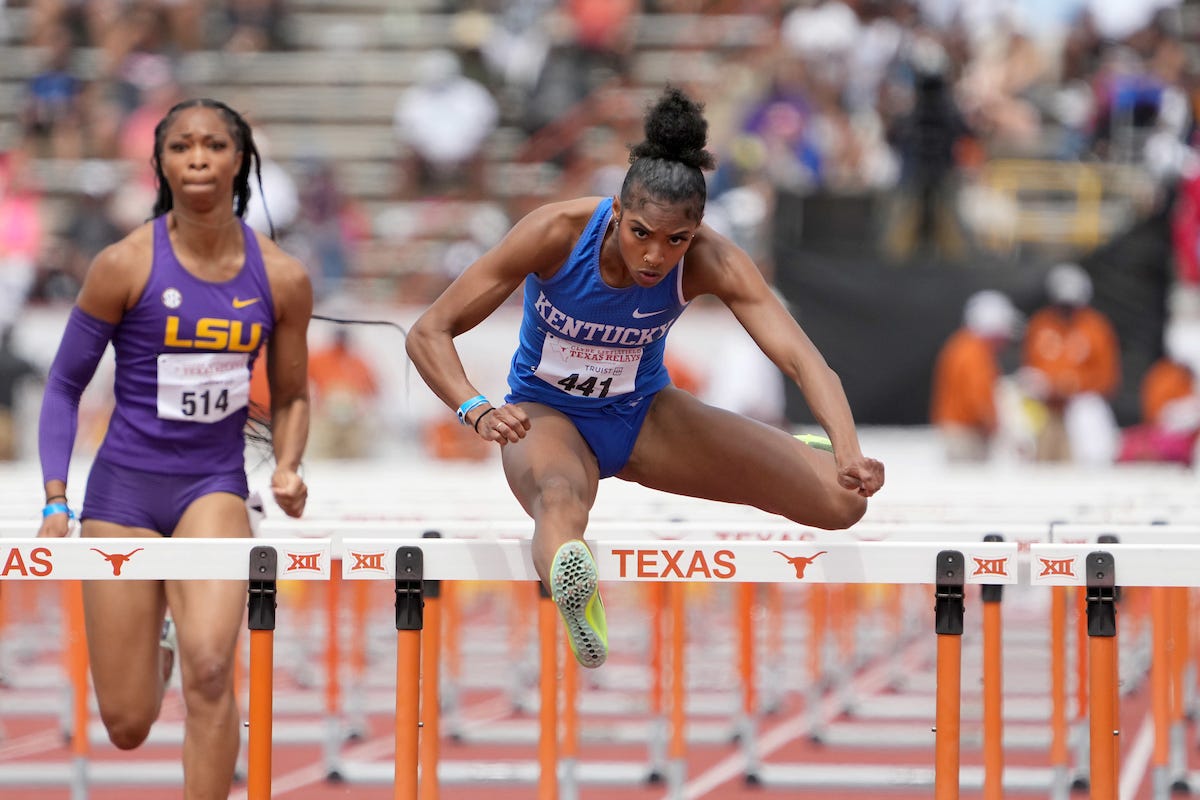
On a weekend when the collegiate outdoor track and field season roared to life, no athlete turned in a better performance than the University of Kentucky’s Masai Russell, who set a collegiate record in the women’s 100-meter hurdles in the Clyde Littlefield Texas Relays.
Yes, Texas teammates Julien Alfred and Rhasidat Adeleke were selected as the co-most outstanding female performers of the meet as they each had a hand in four relay victories, including collegiate records in the sprint medley relay on Friday and in the 800- and 400-meter relays — in that order — last Saturday.
But it was grad student Russell’s 12.36-second clocking in the 100 hurdles that impressed me most.
Her time broke the previous collegiate record of 12.39 set by Brianna Rollins-McNeal of Clemson in 2013, moved her to eighth on the all-time U.S. performer list, and was the fastest in the world this year. It also obliterated her personal best of 12.71, and bettered the Kentucky school record of 12.40 set in 2018 by Jasmin Camacho Quinn, who went on to win the Olympic title in Tokyo in 2021 while representing Puerto Rico.
In addition, it gave her a healthy margin of victory over runner-up Alia Armstrong of LSU (12.57), the defending NCAA champion and the fourth-place finisher in the World Athletics Championships in Eugene, Oregon last July.
“Yeah it’s great, but I knew that I could do it,” Russell said when asked about her performance in an interview with DyeStat. “Especially coming off the indoor season that I had. . . It was great to see the time, but it wasn’t a surprise to me.”
Russell had set a collegiate record of 7.75 in the 60-meter hurdles in an indoor meet at Texas Tech in January. But Southeastern Conference rival Ackera Nugent of Arkansas had lowered that mark to 7.72 in a qualifying heat of the NCAA Indoor Championships on March 10 before edging Russell, 7.73 to 7.75, for the title the following day.
Nugent had advanced to the final of the 100 hurdles in the Texas Relays with a wind-aided time of 12.95 in her qualifying heat on Friday. Russell had run a wind-aided 12.61 in her heat while being aided by a hefty breeze of 5.9 meters per second, way over the allowable of 2.0 for record purposes.
The final lost a little bit of its luster when Nugent did not start the race. But it was still expected to be a humdinger between Russell, in lane 5, and Armstrong, in lane 7.
Those two were clear of the rest of the field after the first three flights of the 10-hurdle race, but Russell began to separate from Armstrong at the fifth barrier before pulling further and further ahead as the race went on.
Russell and Armstrong embraced shortly after the race before a beaming Russell ran back up the track raising her right arm with her index finger extended. She then embraced fourth-place finisher Darci Khan of Howard before waving to the crowd and heading off the track.
While Russell’s performance was helped by the fact that it was run under ideal conditions — a hot day with an aiding wind of 2.0 meters per second — no woman has ever run as fast as she did this early in the year.
And while one race does not guarantee anything, Russell’s performance should put her in the discussion about which women have a legitimate chance to finish in the top three in the USA Track & Field Outdoor Championships in early July. The first-, second-, and third-place finishers in that meet will represent the U.S. in the World Athletics Championships in Budapest, Hungary in August.
“I always knew that I would be part of the conversation when I put everything together,” Russell said. “So it’s just great for it to finally be happening before my eyes, and I’m excited.”
Though she was thrilled with her performance, Russell made it clear that she has no intention of resting on her laurels as she said she hoped to “possibly drop some 12.20s later in the season.”
Ms. Collegiate Record: As mentioned in the previous note, Texas teammates Julien Alfred and Rhasidat Adeleke each ran on three collegiate record relay teams in the Texas Relays.
Alfred’s performances in her first outdoor meet of the year follow a stupendous indoor season in which she set five collegiate records in the women’s 60-meter dash and one in the 200.
She and Adeleke began their relay rampage on Friday afternoon when they teamed up with grad students Kennedy Simon and Valery Tobias to record a time of 3 minutes 36.10 seconds in the sprint medley relay. That crushed the previous mark of 3:38.93 set by Texas A&M last year.
Alfred, a senior from St. Lucia, and Adeleke, a junior from Ireland, ran the 200-meter legs in the sprint medley, followed by Simon, who ran a 400 before passing the baton to Tobias, who clocked 2:01.33 on her 800-meter anchor carry.
The next collegiate record to fall to Texas came a little after noon on Saturday when Alfred, Adeleke, grad student Lanae Thomas, and junior Kevona Davis clocked 1:28.05 in the 800-meter relay to lower the previous best of 1:28.78 set by Oregon in 2017.
The women’s 400 relay record went down about an hour and a half later when Alfred, grad student Ezinne Abba, Adeleke, and Davis ran 42.00 to trim five hundredths of a second off the former best of 42.05 set by LSU in 2018.
Texas then won the women’s 1,600 relay, the final track event of the meet, with a time of 3:23.27 to defeat second-place Arkansas, which ran 3:24.45. The Longhorns’ time was the eighth fastest in collegiate history.
Thomas and Simon ran the first two legs for Texas before Alfred handled the third leg and Adeleke ran a 49.47-second anchor leg. Arkansas, which set a collegiate indoor record of 3:21.75 in the NCAA indoor championships, was anchored by Britton Wilson, who ran 49.68 on her leg.
Double trouble: NCAA indoor champions Matthew Boling and Elija Godwin of the University of Georgia ran on a pair of Bulldog teams that narrowly missed setting collegiate records in the 800 and 1,600 relays in the Texas Relays.
In the 800 relay, sophomore Keshaun Black, junior Boling, freshman Christopher Morales Williams, and senior Godwin ran 1:20.22 to come oh so close to the collegiate record of 1:20.20 held by TCU (1986) and Tennessee (2002). Texas finished second in 1:20.97.
In the 1,600 relay, Georgia won the first race in history in which three collegiate teams ran under three minutes.
Godwin, the NCAA indoor 400 champion, opened up with a 44.80-second first carry. He was followed by two-time NCAA indoor 200 champion Boling, who ran a superb 43.70 on his leg. Junior Caleb Cavanaugh followed with a 45.53 carry before freshman Will Sumner’s 44.79 anchor leg gave the Bulldogs a final time of 2:58.82, just .29 seconds off the collegiate record of 2:58.53 set by Florida last year.
Alabama, which received a 44.0 carry from Tarsis Orogot on its second leg, placed second in 2:59.15, followed by UCLA in 2:59.25.
The Bruins received a 44.31 third carry from Ishmail Turner and a 44.48 anchor leg from Cameron Reynolds.
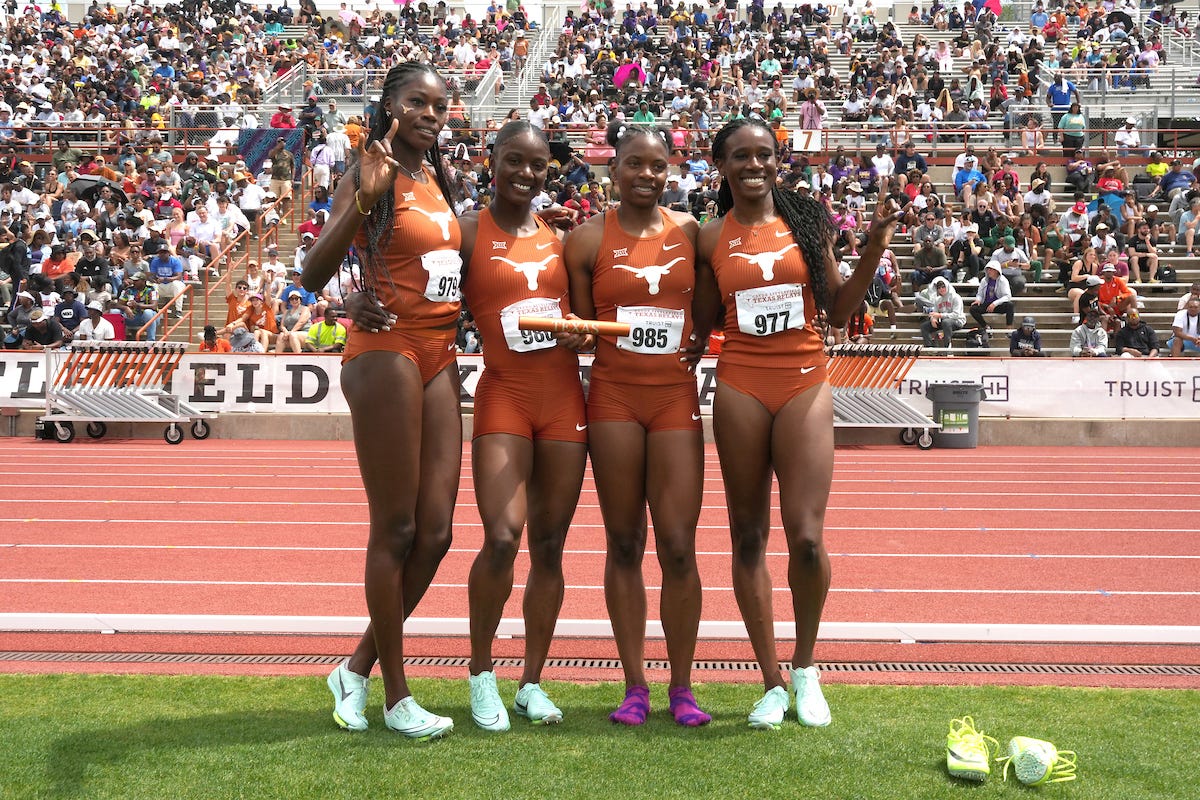
A reunion of sorts: Melissa Jefferson, Abby Steiner, and Jenna Prandini, who ran the first three legs on the U.S. team that upset Jamaica in winning the women’s 400 relay in the World Championships last July, teamed up with Aleia Hobbs to win the invitational race of that event in the Texas Relays last Saturday.
Their team, which was called USA Gold, clocked 41.75 seconds, the fastest time in the world this year. The USA Stars squad placed second in 42.10, followed by a USA Red foursome in third in 42.12.
Sha’Carri Richardson anchored the USA Stars while Olympic 200-meter bronze medalist Gabby Thomas ran the final leg for the USA Red team. Thomas later won the invitational races of the women’s 100 in 11.09 and the 200 in 22.46.
Steiner and Prandini also ran together in the invitational 1,600 relay, joining forces with Kyra Jefferson — first leg — and Olympic 800-meter bronze medalist Raevyn Rogers — anchor — to place second in 3:25.65.
A Hurdles Mechanics squad, that included Olympic 400 hurdle silver medalist Dalilah Muhammad on the first leg and Alexis Holmes on the anchor carry, placed first in 3:24.82.
Huge improvement: McKenzie Long of the University of Mississippi made a gargantuan leap in the women’s 100 meters in the Texas Relays.
First the senior won her qualifying heat in a wind-aided 10.80 on Friday while being aided by a breeze of 3.5 meters per second. Then she took the final in 11.00 last Saturday in a race in which the aiding wind was only 0.2 meters per second.
Long, seventh in the 60 in the NCAA indoor championships, entered the Texas Relays with a personal best of 11.48, which she had run while placing sixth in the USA Track & Field Outdoor U20 (under 20) Championships in 2019.
Solid start: Olympic champion Valarie Allman of the U.S. opened her season with a world-leading throw of 67.90 meters (222 feet 9 inches) in the women’s discus in the Texas Relays on Saturday.
The bronze medalist in the World Championships, Allman hit her top mark in the fourth round after fouling on her first and third attempts, and throwing 57.23 (187-9) on her second. She also had a throw of 65.13 (213-8) in the fifth round before fouling on her sixth — and final — attempt.
Climbing the charts: Leo Neugebauer of the University of Texas was selected as the most outstanding male performer of the Texas Relays after winning the decathlon with a meet-record and personal-best score of 8,478 points.
The runner-up in last year’s NCAA Championships with a then-personal best of 8,362 points, Neugebauer moved to fifth on the all-time collegiate performer list with his performance and to 11th on the all-time German list.
Neugebauer was in third place after opening the competition with a personal best of 10.75 seconds in the 100 meters on Wednesday, but he moved into the lead after leaping 7.47 (24-6¼) in the long jump. He followed that with a personal best of 16.66 (54-8) in the shot put before clearing 2.04 (6-8¼) in the high jump. He concluded the first day with a 48.83 clocking in the 400 that gave him a first-day total of 4,445 points.
He got off to a good start on the second day on Thursday when he ran a personal best of 14.33 in the 110-meter high hurdles. He followed that with a best of 52.65 (172-9) in the discus before clearing a personal best of 5.10 (16-8¾) in the pole vault. He then threw the javelin 51.92 (170-4) before concluding the competition with a time of 4:50.31 in the 1,500.
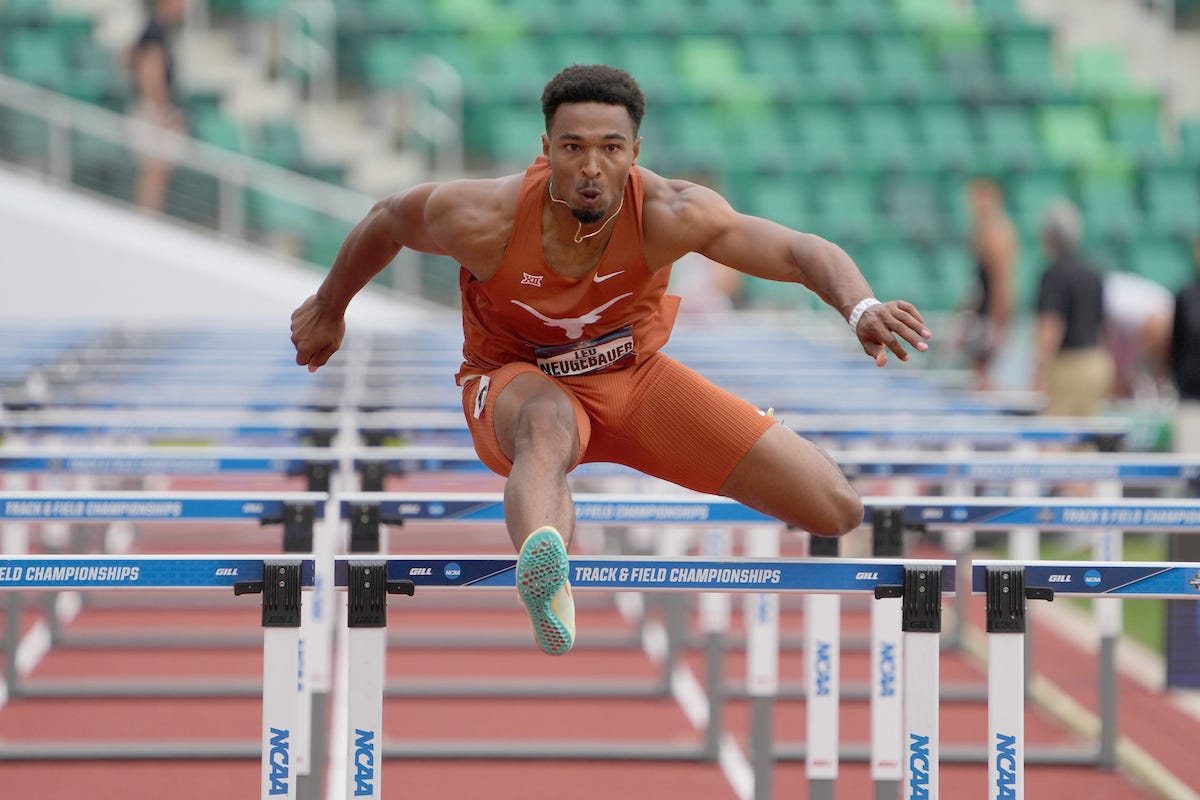
Winds blowing, times dropping: Gusty breezes contributed to some fast times in the women’s 100 meters in the Florida Relays last Saturday.
Talitha Diggs of the University of Florida, who won the collegiate 200 in 22.61 seconds on Friday while running into a slight headwind, ran a wind-aided 10.92 to take the collegiate 100 while finishing seven hundredths of a second in front of Samirah Moody of USC (10.99).
The defending NCAA champion in the 400, Diggs was helped by an aiding wind of 4.1 meters per second in her race.
Tamari Davis of the U.S. was a runaway winner of the invitational women’s 100 as she clocked a wind-aided 10.83 while being aided by a breeze of 5.2 meters per second.
Three for three: Heptathlete Anna Hall of the U.S. won the women’s 400-meter hurdles, high jump, and 800 — in that order — in the Florida Relays.
The bronze medalist in the heptathlon in the World Championships, the 22-year-old Hall won the 400 hurdles in 54.94 seconds on Friday before winning the high jump at 1.89 (6-2¼) and the 800 in 2:03.23 on Saturday.
Hall followed Emily Richards through the first 400 in 61.4 before passing Richards, repelling the challenges of University of Florida teammates Imogen Barrett and Gabrielle Wilkinson, and then holding off Richards over the final 50 meters.
Richards placed second in 2:03.32, followed by Rachel Gearing of Penn State in 2:03.92.
Looking good: The Canadian team that upset the U.S. to win the men’s 400 relay in the World Championships last July won the event in 37.80 seconds in the Florida Relays last Saturday.
The foursome of Aaron Brown, Jerome Blake, Brendon Rodney, and Andre De Grasse ran the fifth fastest time in Canadian history while turning back a Gainesville Elite group that ran 38.13. Dedrick Vanover, World 200 bronze medalist Erriyon Knighton, two-time defending world high hurdle champion Grant Holloway, and Joseph Fahnbulleh comprised the Gainesville Elite relay team.
The 19-year-old Knighton later won the 100 in a wind-aided 9.98 to finish ahead of Jamaican Jelani Walker (10.01), Liberian Fahnbulleh (10.04), and Jamaican Andrew Hudson (10.05).
Rust buster: Rai Benjamin won the men’s invitational 400 meters in the Florida Relays last Saturday in his first race since finishing second to Alison dos Santos of Brazil in the 400 intermediate hurdles in the World Championships last July.
The 25-year-old Benjamin appeared to have the race well in hand after the first 250 meters, but he lost ground to fellow American Quincy in the home straightaway before finishing in 44.94. Hall was second in 45.36.
Making his way back: Wayde van Niekirk continued his resurgence in the men’s 400 meters when he won the South African Championships in 44.17 seconds in Potchefstroom last Saturday.
The yearly world-leading time was the fastest of van Niekirk’s career since he ran 43.98 to win his second consecutive World title in 2017.
“This is a massive jump for me and hopefully I’ll continue going from strength to strength,” van Niekerk said, according to a post on the SuperSport.com site. “My body feels strong and I’m handling the rounds well. There’s a holistic package I’m working on and hopefully it will all come together at the World Championships this year.”
After winning his first World title in 43.48 in 2015, van Niekirk stunned many pundits by lowering the world record to 43.03 in the 2016 Olympic Games in Rio de Janeiro. He was one of the most popular and highly-regarded track and field athletes in the world after winning the 400 and placing second in the 200 in the World Championships in London in 2017. But he tore his anterior cruciate ligament (ACL) and meniscus cartilage in his right leg in October of that year while playing in a charity tag rugby match.
Those injuries marked the beginning of a 2½-year stretch in which he did not compete.
After being eliminated in the semifinals of the Olympic Games in Tokyo in 2021, he placed fifth in the World Championships last year. He then capped his season by running 44.33 in a meet in Bellinzona, Switzerland last September while defeating World silver medalist Kirani James of Grenada.
It will be interesting to see how things unfold in the 400 this season as defending World champion Michael Norman of the U.S. has announced his intention to focus on the 100 and Olympic champion Steven Gardiner of the Bahamas missed the World Championships with an injury.
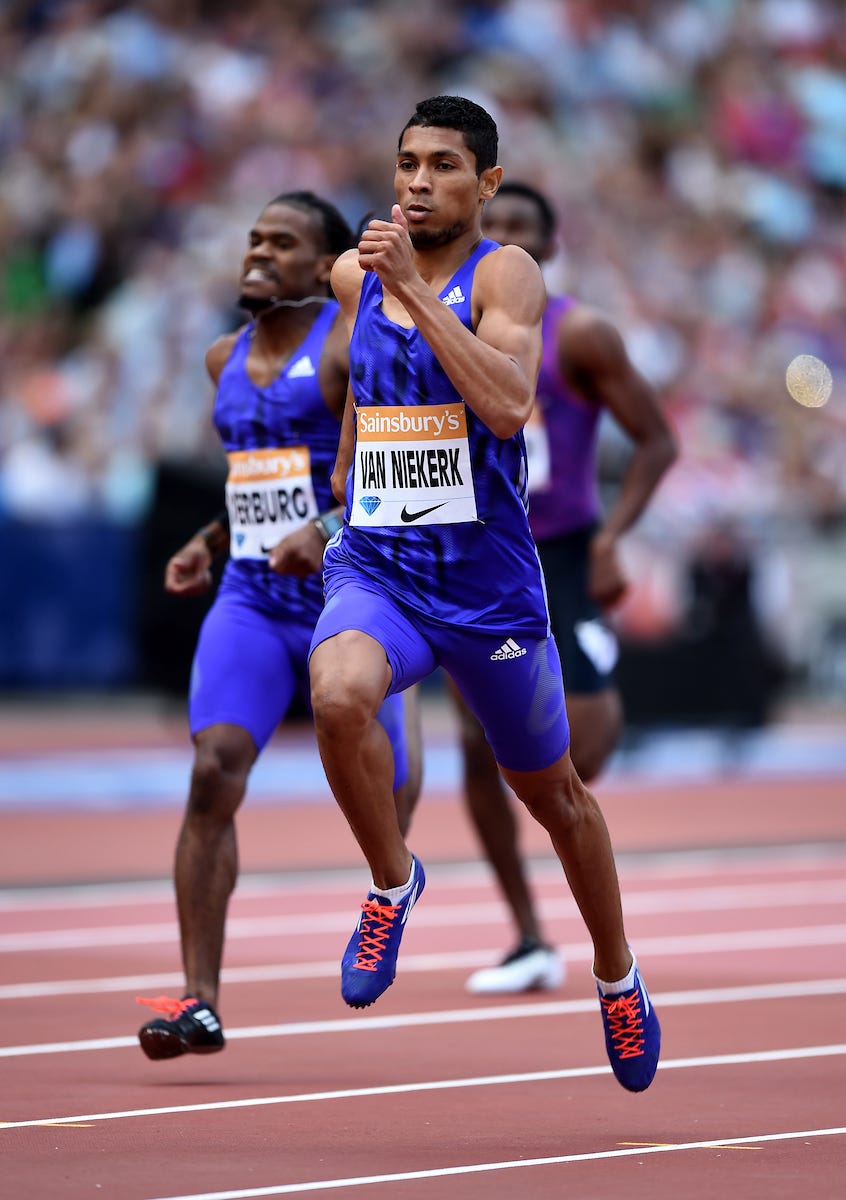
Mr. Consistency: Akani Simbine, van Niekirk’s countryman, posted the two fastest times in the world this year in the 100 meters while on his way to winning his fifth national title in Potchefstroom on March 30.
The fifth-place finisher in the World Championships last year, Simbine ran a yearly world-leading time of 9.98 in a qualifying heat before clocking 9.92 in a semifinal and 10.14 in the final later on the same day.
Simbine, 29, is the only sprinter in the world to have run in the finals of the men’s 100 in the last two Olympic Games and the past three World Championships.
Fresh face: A Jamaican posted the fastest time in the world this year in the women’s 100 meters last week, but it wasn’t Shelly-Ann Fraser-Pryce, Elaine Thompson-Herah, or Shericka Jackson. It was 18-year-old Alana Reid, who won the final of the Class One girls’ 100 in a scintillating 10.92 seconds in the ISSA/Grace Kennedy Boys and Girls Championships in the Jamaican capital of Kingston.
The World U20 (under 20) bronze medalist last year, Reid won her semifinal in a personal best of 11.16 before annihilating that time and moving to fifth on the all-time World U20 performer list with her performance in the final.
The world U20 record of 10.75 was set by Sha’Carri Richardson of the U.S. when she won the 2019 NCAA title during her freshman — and only — season at LSU.
Fresh face II: Like Alana Reid in the girls’ meet, Bouwahjgie Nkrumie posted a yearly world-leading time in the winning the Class One boys’ 100 in 9.99 seconds in the ISSA/Grace Kennedy Boys and Girls Championships in Kingston on March 29.
Nkrumie, 19, moved to third on the all-time world U20 (under 20) list a day before Akani Simbine of South Africa ran 9.98 and 9.92 to take over the yearly world lead in the men’s 100.
Letsile Tebogo of Botswana set the world U20 record of 9.91 in winning the World U20 title in Cali, Colombia last year.
Nice double: Jessica Hull posted a pair of yearly outdoor world-leading times last weekend when she won the women’s 1,500 and 5,000 meters in the Australian Championships in Brisbane.
The 26-year-old Hull won her first national title in the 1,500 on Saturday with a time of 4:04.19 after running her final lap in under 60 seconds. Abbey Caldwell finished second in 4:04.68.
Hull then won her third consecutive title in the 5,000 on Sunday with a time of 15:05.87 to easily defeat second-place Rose Davies, who ran 15:23.85.
Another national record: Eilish McColgan of Great Britain smashed her own national record after coming from behind to win the Berlin Half Marathon last Sunday.
The 32-year-old McColgan ran 1 hour 5 minutes 43 seconds to win the women’s division and cut 43 seconds off her previous best of 1:06:26 that she set while finishing sixth in the Ras Al Khaimah Half Marathon in the United Arab Emirates last year.
Her performance came 30 days after she had lowered the British record in the women’s 10,000 meters to 30:00.86 in THE Ten meet in San Juan Capistrano in California.
Tsigie Gebreselama of Ethiopia, runner-up in the World Athletics Cross Country Championships near Bathurst, Australia on Feb. 18, had a 12-second lead over McColgan when she came through 10 kilometers in 30:44. Her advantage had grown to 16 seconds when she passed 15 kilometers in 46:24, but McColgan began to close in on her after that and Gebreselama eventually finished second in 1:06:13.
Countrywoman Yalemget Yaregal placed third in 1:06:27.
“I’m really happy,” McColgan told race organizers at the finish in an Athletics Weekly post. “It was a bit breezy and cold, but I’m Scottish so I’m used to that weather.”
Sabastian Sawe led a Kenyan sweep of the top three places in the men’s meet with a winning time of 59:00. Alex Kibot placed second in 59:11, followed by Bravin Kiprop in third in 59:22.
National record II: Hillary Bor, a two-time U.S. Olympian in the men’s 3,000-meter steeplechase, set an American road record for 10 miles when he won the Cherry Blossom Ten Mile Run in Washington, D.C. on Sunday.
Bor ran 46:11 to lower the long-standing ratified national record of 46:13 that Greg Meyer set in 1983.
Bor, Emmanuel Bor, no relation to Hillary, and Biya Simbassa led the field through the first five kilometers in 14:38 in the race that doubled as the USA Track & Field Championships.
Emmanuel Bor was the first one of the trio to drop off the pace, and Hillary Bor had a 13-second lead over Simbassa when he came through 10 kilometers in 28:36.
He was never challenged after that while rolling to his second consecutive national championship. Simbassa finished second in 47:09 and Jacob Thomson placed third in 47:27.
Sara Hall won a tight women’s race in 52:37. She was followed by Nell Rojas in 52:38, Emma Hurley in 52:41, and Molly Grabill in 52:42.
The victory was Hall’s fourth national 10-mile title.
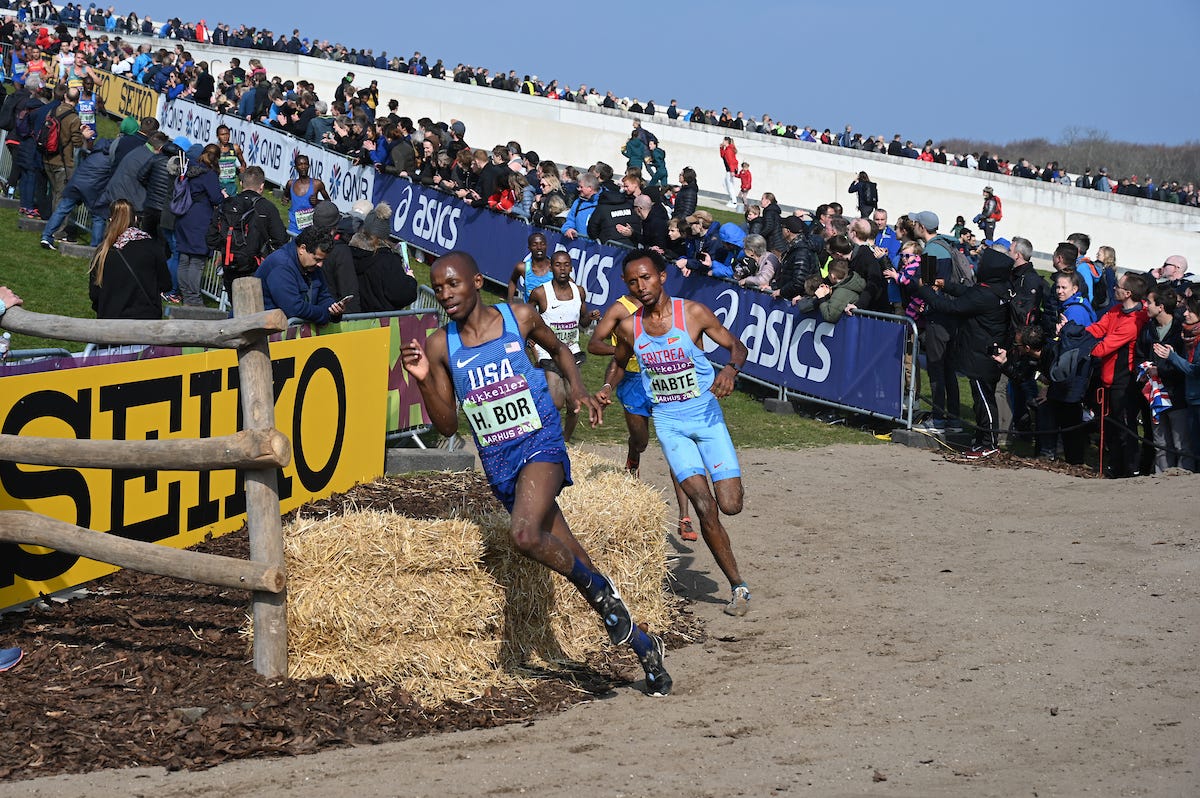
Two liners: Keyshawn Strachan of Auburn University won the men’s javelin in the Texas Relays last Saturday with a personal best of 84.27 (276-6) that moved him to fourth on the all-time collegiate list. The freshman from the Bahamas added more than four meters to his previous best of 79.89 (262-1). . . . Terrence Jones of Texas Tech won the men’s 200 meters in 20.05 in the Texas Relays. The time was the fastest in the world this year for the senior from the Bahamas who won the 60-meter dash in the NCAA indoor championships. . . . Olympic 400 champion Steven Gardiner of the Bahamas won the men’s 200 in 20.14 in the Florida Relays on March 31. Gardiner finished well in front of runner Trevor Bassitt of the U.S. (20.53), the bronze medalist in the 400 intermediate hurdles in the World Championships last year. . . . Jermaisha Arnold of Texas A&M won the women’s 400 in a personal best of 50.71 in the Florida Relays last Saturday. It was the fastest outdoor time in the world this year for the sophomore transfer from Coastal Carolina. . . . Charles Hicks of Stanford and Great Britain set a meet record of 27:57.47 in winning the men’s 10,000 meters in the Stanford Invitational on March 31. The defending NCAA cross country champion was closely pursued by Kenyan Victor Kiprop of Alabama, who placed second in a personal best of 27:57.63.
Talented addition: The Boston Marathon announced last week that Hellen Obiri of Kenya has been added to the women’s elite field for the 127th edition of the race that will be held on Monday, April 17.
The 33-year-old Obiri has been transitioning to racing on the roads after winning the silver medal in the 10,000 meters in the World Athletics Championships last July.
The 2019 World cross country champion finished sixth in 2:25:49 in the New York City Marathon in November in her debut at that distance. But she ran 1:05:05 to win the Ras Al Khaimah Half Marathon on Feb. 18 and 1:07:21 to win the New York City Half Marathon on March 19.



